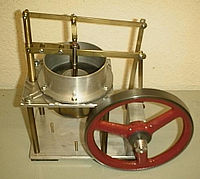
Photo from wikipedia
Abstract Combined heat and power (CHP) systems play an important role in meeting energy requirements and reducing the environmental impact of power generation. Recently, free-piston Stirling engines (FPSE) have attracted… Click to show full abstract
Abstract Combined heat and power (CHP) systems play an important role in meeting energy requirements and reducing the environmental impact of power generation. Recently, free-piston Stirling engines (FPSE) have attracted much attention as a promising CHP technology due to the characteristics such as high efficiency, high reliability, and quiet operation. In this study, a conceptual CHP system integrated with a FPSE was developed. In order to reduce flow separation and thermal losses in the FPSE, an integrated assembly of the pressure vessel, heat exchangers, and new foil type regenerator was designed. To achieve this integrated design, additive manufacturing was used to fabricate these key components and improve the overall FPSE efficiency by removing the design limitation of traditional fabrication methods while decreasing manufacturing cost. Finite element analysis and computational fluid dynamics were conducted to determine the optimal flow distribution and engine structure. Dynamic and rocking mode analyses of displacer assembly were performed. One dimensional thermodynamic modeling of the Stirling engine using Sage software was performed to estimate the system performance. The results indicated that the CHP system could provide 1 kWe electrical power at nearly 38% fuel to electricity efficiency and 1.1 kW of thermal energy at 80 °C. The mapping results of the FPSE show that it has excellent partial power efficiency. Thus, it is concluded that the CHP system based on a FPSE is much more efficient and cost-effective than other CHP system designs and is suitable to provide electrical power and heat for residential applications.
Journal Title: Applied Energy
Year Published: 2019
Link to full text (if available)
Share on Social Media: Sign Up to like & get
recommendations!